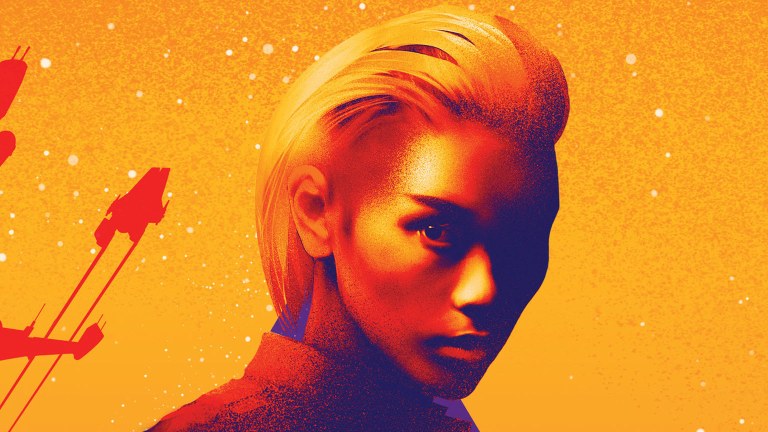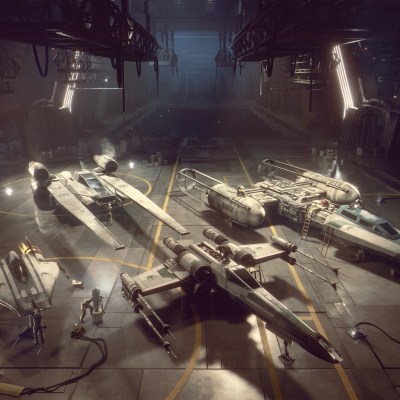What Star Wars: Alphabet Squadron and Shadow Fall’s Yrica Quell Reveals About the Empire
Yrica Quell is a morally gray character in the Star Wars universe. Here's why.

This Star Wars article contains spoilers.
The Alphabet Squadron novel series by Alexander Freed introduces a new cast of Star Wars characters, including a protagonist who offers a new look into the minds of the classic enemy. Yrica Quell is an Imperial deserter with a complex inner life who shows us what it means to leave the Empire only after it has been functionally defeated. The intersection between her personality and her history is the crux of the books and allows readers to learn more about the Empire in the days after the Battle of Endor.
The leader of the titular New Republic fighter team Alphabet Squadron, Quell is mentally and physically scarred, and unsure of herself. But she doesn’t fall into any particular trope this might push her toward: she’s neither frail and indecisive nor heartless and evil. Her anxiety is intertwined with her morally decrepit past and her desire to move forward. It’s rare in Star Wars to have a main character so divided, and especially so for a female character to be so morally thorny and complex. Quell’s interior life is rich, but not in the way one might expect: her lack of self-awareness and unwillingness to examine her own behavior is key to her characterization.
First, what is that personality exactly? Various elements are scattered throughout the books.
As Shadow Fall shows, Quell’s life was at its most stable under the Empire. Her early relationships were cold or ended abruptly. This means without the framework of the Empire she obsesses over how she appears to others. She’s described as guilty and ashamed, although not of the actual atrocities she’s committed, and “she always scratched her wounds.” She’s disconnected from her perceptions of herself: “She wondered how sincere she sounded — she’d never been good at conveying empathy, no matter how real.” Even if she is lying to others, she has a complex relationship with whether she’s lying to herself.
It’s hard to tell exactly what her core is, but one possibility is ambition: even if she doesn’t believe in her cause, she believes in the impetus to do something. But this can’t just be read as a story about a dutiful person looking for a cause to join, because in Quell’s case, the cause she chose was the Empire. Nor is this the story of an anxious student trying to live up to a difficult workload, or similar challenges that might make an average person into a similar brittle shell. Her Imperial past also automatically makes her a villain in need of redemption. But because the book is about moving forward one step at a time — and lacks the metaphorical cosmic moral weight of the Force — that particular story is different than it has been elsewhere in Star Wars.
In Shadow Fall, Quell is pushed to her limit and has lost everything. She learns to just keep moving forward, but that doesn’t translate to a morally upright decision. Quell decides to go back to the Empire. (Perhaps this isn’t surprising, because the way she learned this lesson is through a Sith Temple. Was it influencing her through the Force the whole time in a way she couldn’t sense? More importantly, is it a statement about how platitudes in service of cruel causes aren’t inherently healthy?) Her Alphabet squadmates wouldn’t understand her decision, she thinks, and she’s right. The Empire is still evil, after all, and chasing what little mental peace she ever had leads Quell right back to them.
Her decision in Shadow Fall expertly builds on her characterization in Alphabet Squadron. Even if the Sith temple was influenced her decision to defect from the New Republic, it preyed on existing problems.
Quell’s morality has been skewed since her days with the Empire in the first book. Of her commanding officer in the TIE Fighter corps, she thinks: “Of course, she could also be shot if she ejected. Major Soran Keize was a good man, an admirable man, but she knew there would be no court martial.” She sees no contradiction in the idea of a good man executing his own soldiers. Throughout the book, she’s trying to live up to Keize, who believes in the ability of the Empire to bring order and stop the slaughter of people he considered good soldiers. (At one point Keize “agreed for reasons he couldn’t entirely justify.”) Like Quell, he doesn’t believe in the institution of the Empire, but rather finds meaning from the people within it. Helping Quell from the other direction is New Republic General Hera Syndulla, who tells her she needs to rely on her squad and make sure they know they can rely on her. Both philosophies sound pretty similar if you break them down to the platitude about being loyal to people.
Perhaps this skewing is why Quell doesn’t always know why she does what she does. Despite her “machinelike determination,” she doesn’t always understand her squadmates. This might be because the Empire gave her such conflicting ideas about what constitutes a good motivation. Is it duty? Is it doing day-to-day work while waiting for the rest of her life to begin? She originally planned to join the Rebellion, but slowly got lost in the details of her work in the Imperial fleet, and eventually stayed because she did not want to leave her teammates. During one of the psychological sessions that Quell attends as part of her probationary period in the New Republic, she is asked whether she knows why another member of the squad refused to join at first. She says, “Some people — they won’t act, no matter how much they want to, unless some outside force insists.” She isn’t talking about herself, but it’s clear that the droid she’s talking to senses the irony.
Quell’s psychology is slowly revealed through interview scenes like this: she’s a person who deeply wants order, now forced into the relative chaos of the New Republic. She’s a loner or a person who has trouble making connections after her trauma. She’s a soldier, willing to kill but of the belief that the killing needs to have a purpose greater than just slaughter. Alphabet Squadron doesn’t directly question whether there is such a purpose that is justified, but its placement after the Empire’s Operation Cinder allows it to ask in stark terms since Cinder was so ruthless and random.
The Disney era Expanded Universe handles moral conundrums like Quell’s a bit differently than the classic Legends continuity usually did. Instead of characters almost always deciding to be good, evil, or in between and sticking to those roles, Quell almost haphazardly falls into evil, and then good, and then back again. Alphabet Squadron shows several different versions of her defection from the Empire, each featuring a different lie about why she joined in the first place. In one version, she only joined the Empire to fight it from the inside. This one turns out to be true, but the noblest intentions lead to little. The person she joined to rebel with lost touch with her and Quell coasted onward in the Empire.
The new EU has generally portrayed both sides of the fight as morally complex, or at least more so than the Original Trilogy did. This can be a problem sometimes: it makes it difficult to root for the characters. But it also allows for less blind ambition, questions the idea that all Rebels are heroes, and prevents a squeaky-clean fantasy about war. Sometimes people need to know that good can triumph over evil, though, or that the people on one side of the conflict are inherently less evil than the other. Alphabet Squadron suggests that even if the New Republic is ultimately more peaceful, the people within it are often opportunists and rebels in other areas as well as politically.
Other characters in Alphabet Squadron are morally questionable compared to Luke Skywalker too: Nath Tensent is there for revenge, Kairos is intimidating and mysterious, Wyl Lake and Chass na Chadic are the only ones there purely to fight the Empire (and also because they lost the rest of their squads).
Of course, Han Solo and his smuggler cohort were always present in Legends, and Nath and perhaps Chass and Kairos could fit into that group well. Smugglers in Legends almost always helped the Rebellion, while bounty hunters were their Imperial-adjacent equivalent.
Star Wars doesn’t often see protagonists like this: shell-shocked, tossed on the wind like a leaf. Yrica Quell is somewhere between a gritty killer and a traumatized kid who never grew up, trying to please the people around her while never being quite sure that she even knows how to express her emotions. At times, Alphabet Squadron and Shadow Fall were difficult to read because it cut too close, its insights into Quell too unflinching. She feels like a real person caught between the cruel authority of the Empire and the fledgling democracy of the New Republic, and that makes these books more memorable and adds to the moral questions of the new canon.

